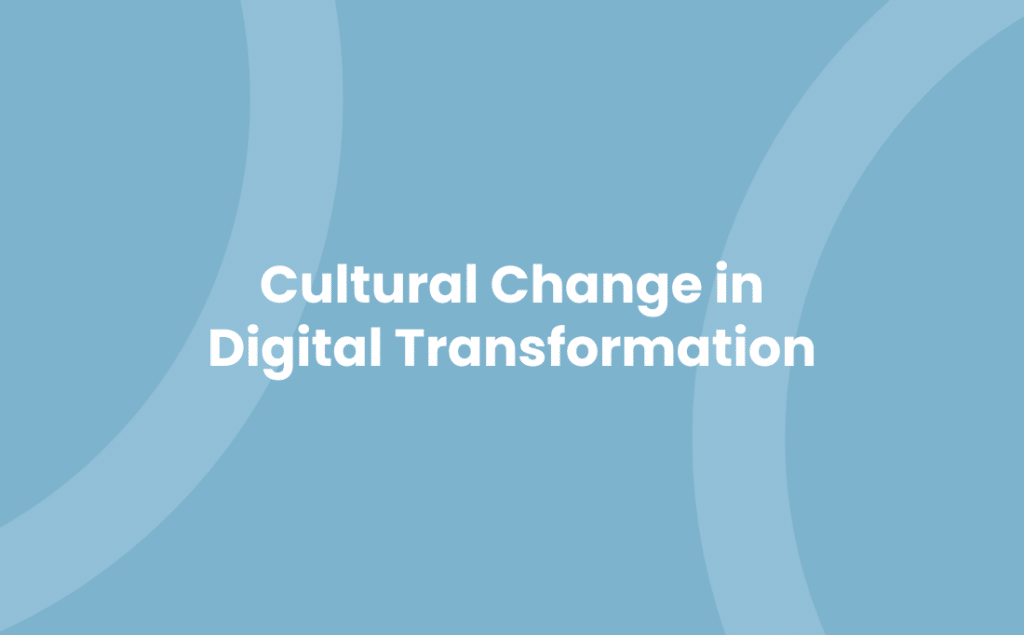Embarking on a journey of digital transformation? Brace yourself, it’s not just about the tech. It’s a cultural shift, a new mindset. It’s about how you, your team, and even your entire organisation adapt to a digital-first world.
Understanding the cultural shift is crucial to successful digital transformation. It’s like learning a new language. You’re not just swapping old tools for new ones; you’re changing the way you communicate, work, and think.
So, let’s delve into the heart of digital transformation: the cultural change. Let’s explore how it impacts your organisation, and why it’s the key to unlocking a successful digital future.
Understanding Digital Transformation and Cultural Change
Grasping the link between digital transformation and cultural change isn’t quite as straightforward as it might initially seem. Remember, digital transformation isn’t merely the adoption of new technology‚ it’s a dramatic paradigm shift. It introduces significant alterations in an organisation’s operations, affecting every aspect from communication to workflows.
Consider the case of digital transformation culture. This refers to creating an environment where innovation thrives, everyone is comfortable with digital tools, and the organisation readily accepts change. In such a domain, experimentation becomes standard practice, fostering a culture receptive to change and enhanced by digital solutions, rather than apprehensive of novel technologies.
Delving deeper into digital cultural change, you’ll find that it’s linked to the people within your organisation and their ability to utilise digital resources, adapt, and innovate. For instance, employees need to value the benefits provided by digital processes. They’ve got to be willing to interchange old routines for new digital ones, enhancing efficiency and augmenting productivity.
It’s crucial to understand that digital transformation is a concept embedded within the organisation’s culture. You’re not merely swapping out analogue systems for digital ones. It’s about a cultural restructuring where every team member, from executive to intern, appreciates the benefits that this cultural shift can bring about.
Understanding how these two areas‚ digital transformation and cultural change‚ intersect, provides insight into the magnitude of the transformation. By identifying the importance of the cultural shift within digital transformation, organisations can develop a robust strategy for changing the very ethos of the organisation. This realisation fosters a digital-friendly environment where everyone is on board with the change, thus ensuring a smoother transition into the digital age.
Remember that in the journey towards a digital future, technology is simply the cutting-edge tool that helps us get there. The real driving force behind successful digital transformation lies in cultural change, in people embracing and leading the change rather than following it. It’s an exciting journey, riddled with challenges but filled with opportunities, waiting to be leveraged. So, as you plan the path to becoming a digital-first organisation, keep in mind that it’s the cultural change that holds the key to a successful transformation.
Why Digital Transformation Requires Cultural Change
Digital transformation isn’t just about introducing new technologies into your business. It involves up-ending the apple cart and making a radical culture shift. This progressive shakeup penetrates your company’s very core, affecting the way you communicate, carry out tasks and solve problems. It’s safe to say that when you embark on the journey of digital transformation, merely implementing digital tools or technologies would be a half measure.
For businesses, a critical component of digital transformation centres on the workforce. Akin to the blood in our veins, employees are the life force of an organisation. Without their buy-in, digital transformation may likely plough into a quicksand of resistance and inertia. That’s why digital cultural change carries immense importance, ranking at par with technological upgrades.
Digital transformation culture promotes an atmosphere brimming with innovation and acceptance for change, a context where traditional ways of doing things can be, and often are, challenged. This culture does not deploy digital tools with reluctance but instead, views them as valuable assets. Simultaneously, it prompts your staff members to adopt a digital-first approach, bringing about efficiency gains in your operations.
Moreover, a digital transformation culture fosters learning. Employees are encouraged to bolster their digital skills, thus empowering them to navigate the digital landscape confidently. These people then come to appreciate the potential and benefits of the new digital processes and routines, which, in turn, invigorates their engagement in the digitalisation venture of your company.
Ultimately, to mark a successful digital shift, your organisation’s culture must take a similar leap. It’s less of a challenge and more of a metamorphosis into a digital butterfly. And remember, a half-baked digital transformation will yield diluted benefits. Hence, aim for a comprehensive digital cultural change. Let your business’s operations, in its entirety, communicate digitally. The result? A streamlined, efficient organisation ahead of the curve in terms of digital adoption and resilience.
Key Steps in Implementing Cultural Change for Digital Transformation
Initiating cultural change within an organisation geared towards digital transformation isn’t an overnight journey. It requires a strategic plan, clear communication and the flexibility to evolve as necessary. Here’s a look at the primary steps.
- Identify and Define the New Culture: Understand what a digital transformation culture signifies for your organisation. Does it mean becoming more agile, fostering continuous innovation, or embracing a fail-fast approach? Recognise and define the characteristics of the culture you wish to nurture.
- Engage All Levels of the Organisation: From board members to entry-level employees, everyone should be involved in the cultural change. This inclusivity fosters a sense of ownership and acceptance at all levels.
- Establish Clear and Consistent Communication: Transparent and regular communication is a cornerstone to implement cultural change. Use your internal communication channels to relay the vision and progress of the shift, maintaining a dialogue with your team.
- Promote Digital Skills and Education: Equip your workforce with the necessary skills for digital transformation. Offer training and educational resources to encourage continuous digital learning.
- Positive Reinforcement: Reinforce the new behaviours and values critical for digital transformation. Acknowledge and reward those who exemplify and promote the digital transformation culture.
- Operate in Iterations: Acknowledge that cultural change doesn’t happen all at once. Review, measure and adjust your approach over time. Use feedback from your workforce to guide modifications.
- Lead by Example: Leaders play a vital role in implementing cultural change. They must exemplify the mindset, behaviour, and values of the desired digital transformation culture.
As you implement these steps, remember to be patient and persistent. An overarching digital cultural change won’t happen instantly, but with consistent effort, you’ll gradually observe a shift in your organisation’s DNA towards embracing and thriving in a digital transformation culture.
Case Studies: Successful Digital Transformation Through Cultural Change
Venturing into the depths of digital transformation, you’ll find real-life stories of companies who achieved success by instilling a digital culture. Let’s unravel the journey of two such businesses.
- DBS Bank, Asia’s leading financial service group, achieved a remarkable digital transformation by fostering a digital culture. Encouraging employees to take digital pledges, incorporating digital concepts in training programmes, and promoting a start-up mindset, these were strategies DBS employed. In 2019, DBS’ efforts bore fruit when they received the accolade of World’s Best Digital Bank by Euromoney.For instance, DBS launched DigiBootcamp, its in-house training programme ingraining fundamental digital concepts in employees. Given that employees are integral to the change process, skills development served as an essential pillar for DBS’ digital culture.
- Microsoft, a giant in the tech industry, refreshed its corporate culture as part of their digital transformation journey. Seeing stagnation in its productivity and creativity, Microsoft adopted a growth mindset culture. It sparked a new wave of innovation and cooperation, ensuring Microsoft stayed relevant in an evolving technological landscape.Here’s a demonstration: Microsoft prioritised collaboration by fostering an open source culture. It allowed better integration with other platforms, increasing market presence. This step was a clear showcase of Microsoft’s embrace of digital cultural change.
In both companies, a dedicated emphasis on fostering a digital culture was a prominent strategy in their digital transformation journey. The lesson? True digital transformation comes not from implementing new technologies, but rather from embracing a digital culture that champions innovation.
Strategies for Leadership in Digital Transformation
Entering the arena of digital transformation calls for avant-garde leaders committed to fostering a digital culture. Notably, business leaders play a crucial role in cultural change within digital transformation. Their strategies and actions influence this digital cultural change at various levels in an organisation.
- Define Clear Vision and Strategy: As a leader, set a clear digital transformation vision, aligning it with an all-encompassing strategy. This vision requires wide-ranging commitment, reflecting directly on business objectives and customer experience goals.
- Promote Digital Literacy: Champion the proliferation of digital literacy in each corner of your organisation. This step involves the training of staff in new digital paradigms, emphasising its place in business processes.
- Lead with Empathy: Digital transformation, with its novelty, might breed anxiety among employees. Counter this issue with empathy, facilitating a supportive environment for the team to grasp new technology and workflows.
- Encourage Collaboration and Innovation: Promote a workspace that champions collaboration and rewards innovation. Open, cross-department discussions can lead to creative problem-solving techniques, acting as the catalyst for your digital transformation culture.
- Empower Teams: Empower your team members with decision-making abilities. Autonomy to take calculated risks aids in fostering a culture of innovation and agility.
- Communicate Regularly: Transparent communication plays a critical role. Announce the progress, changes, learnings, and results regularly. This exchange helps in creating an informed and united workforce.
- Adopt Agile Practices: Embrace agility. Rapid response to changes, learning from failures not just in theory but practice paves the way for a dynamic digital culture.
- Measure Performance: Keep track of the impact of changes. Use relevant metrics to measure success, progress, and areas of improvement.
Leaders form the spearhead for digital transformation, shaping the ethos, setting the pace and making decisive contributions to the cultural shift. They can foster a digital transformation culture that encourages innovation, promotes digital literacy, and nurtures empathy. By undertaking these suggested strategic steps, you, as a leader, could foster effective digital transformation in your organisation.
Challenges and Barriers in Digital Transformation Cultural Change
As your business embarks on the journey toward digital transformation culture change, it faces multiple roadblocks. Understanding these hurdles empowers your management to develop robust strategies that fend off potential setbacks.
Three primary challenges stand in sways of a smooth digital cultural change. Firstly, resistance to change exists in every organisation. Change, even if it’s for better prospects, often meets with apprehension and resistance from employees accustomed to tried-and-tested workflows and methodologies. To counteract this, promote inclusivity in your digital cultural change agenda. Engage your workforce in decision-making processes and offer them a sense of ownership over this digital-shift.
Secondly, another challenge is the lack of digital literacy among employees. As technologies rapidly evolve, keeping pace with new tools and technology can be overwhelming. Invest in training and developing your workforce. Provide suitable resources for employees to learn and adapt to the new digital landscape.
Thirdly, other barriers include limited resources and insufficient funding. Embracing digital transformation often requires significant financial investment which can be a challenge for small and medium businesses. To combat this hurdle, try leveraging cost-effective technologies and solutions. Seek partnerships and collaborations. After all, digital transformation doesn’t equate to the most expensive technology, but the most effective one!
Addressing these challenges early contributes to a smooth digital transformation cultural change. Remember, creating a culture of digital fluency within your organisation doesn’t happen overnight‚ it’s a transformative journey. So, expect hurdles, plan for them, and persevere.
Conclusion
So, you’ve seen how vital a cultural shift is in the journey of digital transformation. It’s not just about integrating new technologies but also about reshaping communication, workflows, and fostering a culture of innovation. As a leader, your role is pivotal in promoting digital literacy, empathy, and collaboration within your team. Yes, challenges like resistance to change and limited resources may arise. But remember, with the right strategies like promoting inclusivity and investing in employee training, these hurdles can be overcome. It’s about starting early, addressing these challenges head-on, and steering your organisation towards digital fluency. Embrace this change and lead your team towards a successful digital transformation.



